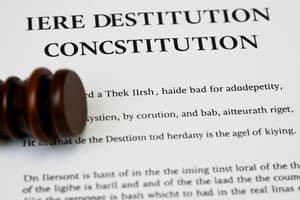Podcast
Questions and Answers
What is a Commencement Order primarily used for?
What is a Commencement Order primarily used for?
- To amend existing legislation
- To create statutory interpretation
- To activate an Act, giving it force of law (correct)
- To provide judicial reviews
Which principle asserts that legislation cannot be altered by judges?
Which principle asserts that legislation cannot be altered by judges?
- Judicial Review
- Separation of Powers (correct)
- Delegated Legislation
- Ultra vires
In statutory interpretation, what does the Mischief Rule focus on?
In statutory interpretation, what does the Mischief Rule focus on?
- Combining several interpretative methods
- Avoiding absurd results
- The mischief the legislation was enacted to prevent (correct)
- The literal meaning of the text
Which case illustrates the Literal Rule of statutory interpretation?
Which case illustrates the Literal Rule of statutory interpretation?
What type of aids to interpretation are intrinsic aids?
What type of aids to interpretation are intrinsic aids?
Which statement accurately describes the implications of Article 41.3?
Which statement accurately describes the implications of Article 41.3?
What is a characteristic of unenumerated rights as described in the context of the Irish Constitution?
What is a characteristic of unenumerated rights as described in the context of the Irish Constitution?
Which of the following articles of the Irish Constitution is associated with the Oireachtas?
Which of the following articles of the Irish Constitution is associated with the Oireachtas?
What is required for amendments to the Constitution as outlined in Articles 46 and 47?
What is required for amendments to the Constitution as outlined in Articles 46 and 47?
Which Supreme Court case highlighted the concept of unenumerated rights?
Which Supreme Court case highlighted the concept of unenumerated rights?
Which of the following is a major primary source of law in Ireland?
Which of the following is a major primary source of law in Ireland?
What does Article 41.3.1 of the Irish Constitution focus on?
What does Article 41.3.1 of the Irish Constitution focus on?
Which of the following statements about fundamental constitutional rights is TRUE?
Which of the following statements about fundamental constitutional rights is TRUE?
What defines unenumerated rights in the Irish Constitution?
What defines unenumerated rights in the Irish Constitution?
Under what condition can the right to own property be limited according to the Irish Constitution?
Under what condition can the right to own property be limited according to the Irish Constitution?
What is the characteristic of EU Regulations?
What is the characteristic of EU Regulations?
What is a key feature of EU Directives?
What is a key feature of EU Directives?
Which of the following statements about Decisions in EU law is accurate?
Which of the following statements about Decisions in EU law is accurate?
What distinguishes Recommendations and Opinions from other types of EU legislation?
What distinguishes Recommendations and Opinions from other types of EU legislation?
What is the main purpose of EU Directives?
What is the main purpose of EU Directives?
What principle indicates that similar cases should be decided alike?
What principle indicates that similar cases should be decided alike?
Which aids are categorized as extrinsic aids in understanding legislation?
Which aids are categorized as extrinsic aids in understanding legislation?
Which rule of language suggests that when one or more specific things are mentioned, others are excluded?
Which rule of language suggests that when one or more specific things are mentioned, others are excluded?
What term describes the reason for a judicial decision that is binding in future cases?
What term describes the reason for a judicial decision that is binding in future cases?
What document serves as the backdrop for the formation of the European Union?
What document serves as the backdrop for the formation of the European Union?
Which of the following is NOT a form of secondary law in the European Union?
Which of the following is NOT a form of secondary law in the European Union?
What legal concept allows higher courts to overrule decisions made by lower courts?
What legal concept allows higher courts to overrule decisions made by lower courts?
Which article of the Irish Constitution gives EU law force in Ireland?
Which article of the Irish Constitution gives EU law force in Ireland?
What is the first stage in the legislative process for a bill?
What is the first stage in the legislative process for a bill?
Which articles of the Constitution outline the role and powers of the President?
Which articles of the Constitution outline the role and powers of the President?
Which of the following is known as the 'upper house' of the Oireachtas?
Which of the following is known as the 'upper house' of the Oireachtas?
What type of legislation is conferred on the Oireachtas by Article 15.2.1 of the Constitution?
What type of legislation is conferred on the Oireachtas by Article 15.2.1 of the Constitution?
What role does the Ceann Comhairle play in the Dáil?
What role does the Ceann Comhairle play in the Dáil?
In the process of drafting a bill, which party is typically responsible for creating the initial proposal?
In the process of drafting a bill, which party is typically responsible for creating the initial proposal?
What is one of the arguments for the proposed abolition of the Seanad?
What is one of the arguments for the proposed abolition of the Seanad?
Which Bill category requires the approval of the Dáil and Seanad but does not involve spending government money?
Which Bill category requires the approval of the Dáil and Seanad but does not involve spending government money?
Flashcards
Irish Constitution (Bunreacht na hÉireann)
Irish Constitution (Bunreacht na hÉireann)
The highest domestic source of law in Ireland that sets out how the country is run and guarantees fundamental rights.
Fundamental Constitutional Rights
Fundamental Constitutional Rights
Fundamental rights enshrined in the Irish Constitution that protect individuals from state interference.
Unenumerated Rights
Unenumerated Rights
Rights not explicitly mentioned in the Constitution but recognized by judges through its interpretation.
Limitations on Fundamental Rights
Limitations on Fundamental Rights
Signup and view all the flashcards
Case Law / Common Law
Case Law / Common Law
Signup and view all the flashcards
Delegated/Secondary Legislation
Delegated/Secondary Legislation
Signup and view all the flashcards
Parent or Enabling Act
Parent or Enabling Act
Signup and view all the flashcards
Ultra Vires
Ultra Vires
Signup and view all the flashcards
Statutory Interpretation
Statutory Interpretation
Signup and view all the flashcards
The Literal Rule
The Literal Rule
Signup and view all the flashcards
Constitutional Right to Marry
Constitutional Right to Marry
Signup and view all the flashcards
1937 Irish Constitution
1937 Irish Constitution
Signup and view all the flashcards
Enumerated and Unenumerated Rights
Enumerated and Unenumerated Rights
Signup and view all the flashcards
Supremacy of the Irish Constitution
Supremacy of the Irish Constitution
Signup and view all the flashcards
Amendment of the Irish Constitution
Amendment of the Irish Constitution
Signup and view all the flashcards
EU Regulation
EU Regulation
Signup and view all the flashcards
EU Directive
EU Directive
Signup and view all the flashcards
Judicial Precedent (Stare Decisis)
Judicial Precedent (Stare Decisis)
Signup and view all the flashcards
Sources of Law
Sources of Law
Signup and view all the flashcards
Oireachtas
Oireachtas
Signup and view all the flashcards
Dáil Éireann
Dáil Éireann
Signup and view all the flashcards
Seanad Éireann
Seanad Éireann
Signup and view all the flashcards
President of Ireland
President of Ireland
Signup and view all the flashcards
Acts of the Oireachtas
Acts of the Oireachtas
Signup and view all the flashcards
Legislative Process
Legislative Process
Signup and view all the flashcards
Delegated Legislation
Delegated Legislation
Signup and view all the flashcards
Bill
Bill
Signup and view all the flashcards
Presumption of Constitutionality
Presumption of Constitutionality
Signup and view all the flashcards
Presumption Against Retrospective Effect
Presumption Against Retrospective Effect
Signup and view all the flashcards
Ejusdem Generis
Ejusdem Generis
Signup and view all the flashcards
Expressio Unius
Expressio Unius
Signup and view all the flashcards
Nosciter a Socis
Nosciter a Socis
Signup and view all the flashcards
Extrinsic Aids
Extrinsic Aids
Signup and view all the flashcards
Hierarchy of Courts
Hierarchy of Courts
Signup and view all the flashcards
Study Notes
Irish Legal System - Sources of Law
- Four major primary sources of law in Ireland are: European Union Law, Bunreacht na hÉireann/Irish Constitution, Legislation, and Case Law/Common Law.
- A constitution is the supreme source of law in a state, the highest-ranking domestic source.
- It outlines how the country functions and guarantees fundamental rights.
- Bunreacht na hÉireann (Irish Constitution) includes fundamental rights, for example:
- Protection of marriage (Art. 41.3.1)
- Right to marry regardless of sex (Art. 41.4)
- Right to free primary education (Art. 42.4)
- Right to own private property (Art. 43.1)
- Freedom of conscience and religion (Art. 44.2.1)
- Court cases generally held in public, with limitations in specific cases (Art. 34)
- Fundamental rights are not absolute and can be limited for the public good or public order (e.g., personal liberty, house inviolability, right to own property).
- Unenumerated rights, not specifically mentioned, are identified through constitutional interpretation. Marriage is considered a constitutional right by implication (Article 41.3).
- The 1922 Constitution(Free State Constitution), the 1937 Constitution (in force currently), and the ethos/influences behind the 1937 constitution are parts of the Irish Constitution.
- The Constitution is divided into 50 articles in sections and subsections (Institutions of the State and Fundamental Rights).
- The Constitution is available online.
- The Oireachtas, consisting of the Dáil, Seanad, and the President, make laws. (Articles 15-27 of the Constitution).
- The 1998 amendment to Articles 2 & 3 outlines the national territory.
- The Oireachtas - Article 15 (The Oireachtas)
- Composition of the Oireachtas is based on Articles 15 to 27 of the Constitution
- The Dáil (Articles 16 and 17):
- Election of TDs
- Duration of Dáil
- Functions of TDs
- Composition of the Government (Taoiseach and Tánaiste)
- Dáil privilege
- Role of the Ceann Comhairle
- Rules of the Dáil
- Seanad Éireann.
- Sometimes referred to as the “upper house.”
- Composition of the House.
- Proposed abolition of the Seanad based on a 32nd amendment proposal.
- Arguments for and against the abolition of the Seanad (reform).
- Role, Eligibility, Election and term of office, Nomination, Functions, Ceremonial role, Powers under the constitution, powers never used, Removal from office, Presidential Commission, Council of State (Articles 12-14) are aspects of The President
- Statutes or acts of the Oireachtas are primary legislation.
- The legislative process for making a bill involves:
- First Stage: initiating the bill
- Second Stage: debating general principles of the bill
- Third Stage: examining the bill section by section
- Fourth Stage: considering amendments
- Fifth Stage: passing the bill by the House
- Enactment: President signing the bill into law
- The Role of the President:
- Role of the President in the legislative process (Article 26, 27).
- Every piece of legislation and judicial decision must comply with the Constitution.
- An individual can challenge a law that conflicts with the Constitution.
- Declarations of invalidity ( De Burca v Attorney General in 1976, Juries Act 1927)
- Constitutional Amendments (Articles 46 and 47). Only amendable by the people of Ireland in a referendum.
- Revising the Constitution and amendments can be made through the Constitutional Convention, The Citizens' Assembly
- Primary Legislation (Acts of the Oireachtas, also known as Statutes), how Acts are made and legislative process, different types of bills, website for finding current bills.
- Delegated or Secondary Legislation
- made by Government Departments or other delegated bodies -Power must be delegated by an Act of the Oireachtas (Parent or Enabling Act)
- Mostly enacted as Statutory Instruments (S.I.s) (Orders/Regulations/Schemes/Rules)
- Includes examples like Commencement Orders and Bye Laws (Local Authorities).
- Control of Delegated Legislation – Control by the Oireachtas and Courts via Judicial Review, “ultra vires”.
- Statutory Interpretation - Methods used to interpret laws (e.g., Literal, Golden, Mischief Rule, Purposive/Schematic/Teleological)
- Statutory Interpretation Cases (e.g., Whitely v Chappell, Re Sigsworth, Smith v Hughes)
- Aids to Interpretation - Intrinsic Aids (contained within the Act, Explanatory Memorandum, Act itself), Presumptions (against retroactivity & presumption of constitutionality), Rules of Language, Extrinsic Aids (Outside the act, previous Acts, reports of law reform bodies, dictionaries, international treaties)
- Judicial Precedent - Common Law, Judge-made Law, Doctrine of Precedent (stare decisis), ratio decidendi, persuasive authorities (lower court decisions, decisions from other jurisdictions, dissenting judgments/opinions)
- Hierarchy of Courts, ability to overturn lower court decisions, distinguishing and locating cases, importance of law reports, advantages/disadvantages of judicial precedent
- European Union Law (e.g., Treaty of Rome, 1957)
- Background to formation and original membership.
- Irish membership (1973); bound by Court of Justice decisions and implementation of EU Legislation; 1972 referendum; Article 29.4.6 gives EU law force of law in Ireland.
- European Union Institutions (Council of the European Union, European Commission including operations, European Parliament, Court of Justice, European Council)
- Types of European Union Secondary Legislation, details on EU Regulations, EU Directives, EU Decisions, and EU Recommendations & Opinions. Detailed differences in application and binding nature.
Studying That Suits You
Use AI to generate personalized quizzes and flashcards to suit your learning preferences.




